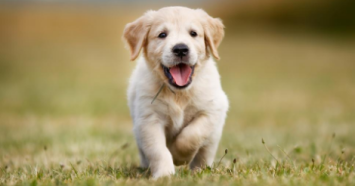
Bringing home a puppy is beyond exciting. They’re the cutest things on the planet with their big wet eyes and that puppy breath. Falling in love with a puppy is the easy part – but the work begins the day you bring them home. Knowing how to raise a puppy ensures a healthy and happy start in life.
What to Buy for a New Puppy
Puppies sometimes find their way into our lives unexpectedly, but this new puppy checklist will make things much easier. Here is my list of first-day-must-haves for a puppy:
Food & water bowls that they can reach and preferably not spill
Collar & leash
ID tag & microchip. If you’re in a pinch, write your phone number on the puppy’s collar in permanent marker
A comfy bed, treats, and toys are also great to have. If you plan to crate-train them, have this ready for puppy’s first few days at home too.
Down the line, you’ll need more puppy care items like a toothbrush, training clicker, and parasite prevention. Budget an extra $100-300, in addition to adoption or purchase fees to get your puppy started off on the right paw.
Puppy’s First Night Home
Once the excitement has worn off, you’d think the puppy would be content to sleep through the night – but that’s not always true. If they’re recently separated from their littermates or mom, the first night can be very hard on them. Many puppies seek safety and comfort at night and crying and whining is pretty common. If your puppy is crying at night, here are a few ways to help them sleep through the night:
Exercise before bedtime. A long walk or some play in the living room will help tire them out. Once they’re tired, let them wind down and have a quiet place to rest
Provide safe comfort items. You may want to put their bed, chew toy, or blanket into the crate, but until they’ve gotten over the chewing phase, that’s not be safe. Offer durable toys, like a Kong with kibble, to give them diversion and comfort
Play radio, tv, or other white noise. Talk radio or a calm movie may help your puppy feel like someone is close by during the lonely hours. Better yet, download a white noise app with a “heartbeat” setting to provide a comforting sound
Keep the crate in your space. Having them close to you or placing some of your clothing near their crate helps them feel secure. If they can smell you, they might think it’s almost as good as the real thing
Whatever you do, don’t praise or reward whining and crying with treats or cuddles. You can check on them and give them calm reassurance, but don’t reinforce this behavior or you’re doomed for sleepless nights ahead. If all else fails, check out this guide to how much sleep a puppy needs to see if your schedule is realistic.
How to Raise a Puppy
A first-timer with a new puppy will have a steep learning curve. They’re cute, but they require a lot of care in the early months. Here are the most important things to remember:
Feeding
Puppies may not be able to safely go very long between feedings. While most can start on dry puppy food around 10 weeks old, they likely need 4 feedings a day until around 12 weeks, possibly longer for small breeds.
After 12 weeks, you may be able to scale them back to 3 meals per day. Once they hit the six-month mark you should be able to switch to two puppy meals per day. After they hit their first birthday, talk to their vet about switching to adult food and what the appropriate portion should be.
Note: These are all general guidelines and may vary by size and breed, so ask your vet for the best protocol.
Crate Training
Puppies explore with their mouths and are not to be trusted around valuables, kid’s toys, or furniture. The best way to keep them safe and protect your home is to crate train your puppy right away.
Puppies generally feel safer and more comfortable in a crate, with their comfort items, and transition to the crate easier at this age. It can also help with another tough challenge: potty training.
Potty Training
Puppies can’t physically “hold it” yet. An eight-week-old may need to go potty every 2-3 hours. You may need to plan for a dog walker or neighbor to help while you’re at work, and you’ll need to take them out in the middle of the night too.
You can expect some accidents for the first few months, but there are steps to housebreaking your puppy to help them do their business outside reliably. Make it a positive experience for them and they’ll do their best for you.
Enjoy the young puppy weeks – it’s a great opportunity for you to bond. They’ll be grown up before you know it, but you’ll be best pals for a lifetime.